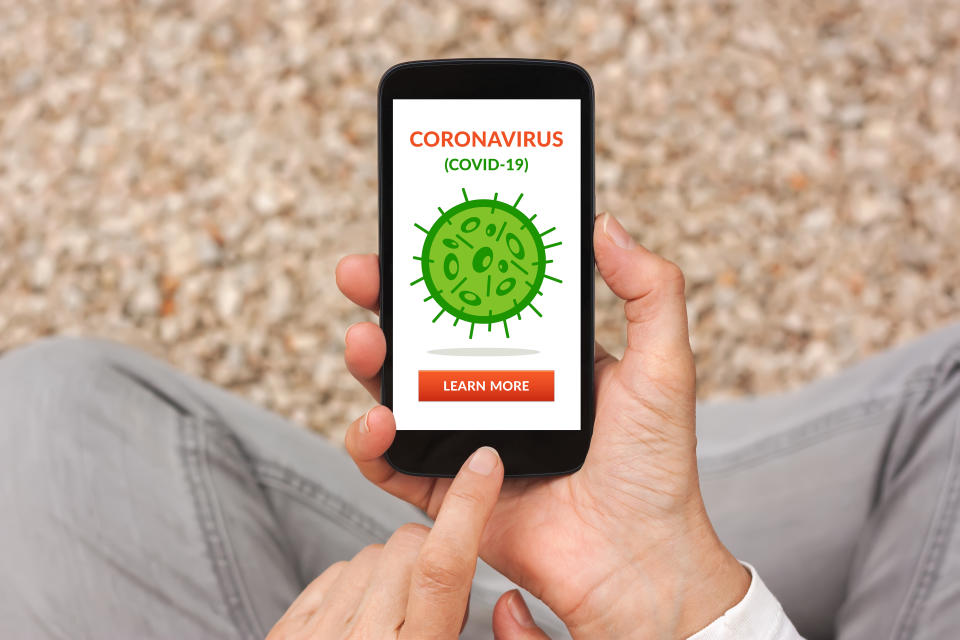App could one day detect asymptomatic coronavirus by listening to forced coughs

An app could one day detect whether a person is an asymptomatic carrier of the coronavirus.
A new continuous cough is one of the tell-tale signs of the infection, however, not everyone who catches the virus develops symptoms.
While asymptomatic carriers may not cough persistently, they could still do so to clear their throat from time to time.
Scientists from the Massachusetts Institute of Technology (MIT) found that an asymptomatic person coughs differently to a healthy individual, however, this variation cannot be picked up by the human ear.
The team therefore developed an artificial intelligence (AI) model, built on tens of thousands of samples, that distinguishes between the coughs.
Read more: Long COVID given official diagnosis
When put to the test, the model correctly identified 98.5% of the coughs that came from people with the coronavirus, of which 100% of the samples produced by asymptomatic carriers were flagged.
If an app is approved, a user could download it for free, cough into their phone once a day and be prompted to get tested if needed.

“The effective implementation of this group diagnostic tool could diminish the spread of the pandemic if everyone uses it before going to a classroom, a factory or a restaurant,” said study author Brian Subirana.
The rate of people who catch the coronavirus but do not develop symptoms has been debated throughout the outbreak.
It has been argued people who do not cough or sneeze, which are both symptoms and the main routes of transmission, would be expected to pass the infection on to fewer people.
Read more: Social distancing leading to surge in dengue cases in Thailand
Others have stressed, however, most people who claim to be asymptomatic actually have very mild illness.
People who do not notice their symptoms do not know to order a coronavirus test and isolate.
Watch: Can you catch coronavirus twice?
Prior to the pandemic, the MIT scientists were investigating whether coughs differ between people with conditions like Alzheimer’s.
“The sounds of talking and coughing are both influenced by the vocal cords and surrounding organs,” said Subirana.
“This means when you talk, part of your talking is like coughing and vice versa.
“So we thought, why don't we try these Alzheimer's biomarkers [to see if they're relevant] for COVID [the disease caused by the coronavirus].”
Read more: Long COVID may cause skin symptoms
In April, the MIT scientists created a website where people could upload the sound of themselves forcing out a cough.
The participants also completed a survey of any symptoms they were experiencing, as well as whether they had tested positive for the coronavirus.
Since the site was created, the scientists have accumulated around 200,000 forced-cough recordings, “the largest research cough dataset that we know of”, according to the team.
Around 2,500 of the recordings were submitted by people with confirmed coronavirus, some of whom were asymptomatic.
The scientists used these audio samples to “train” their AI model. They then fed the model with other samples to test its potential.
Results – published in the IEEE Open Journal of Engineering in Medicine and Biology – reveal the model identified 98.5% of the coughs from people who were confirmed to have the coronavirus.
Of these samples, the app picked up on all (100%) of the recordings produced by asymptomatic carriers.
“We think this shows the way you produce sound changes when you have COVID, even if you’re asymptomatic,” said Subirana.
Four markers – vocal cord strength, “sentiment”, lung and respiratory performance, and muscular degradation – are said to be affected by the coronavirus, regardless of whether the individual experiences symptoms.
If an app using this technology is approved by the US Food and Drug Administration, it could help asymptomatic people seek out a test.
In the meantime, the scientists are working with several hospitals around the world to collect a larger, more diverse set of cough recordings to help strengthen the app’s accuracy.
Watch: What is long COVID?


